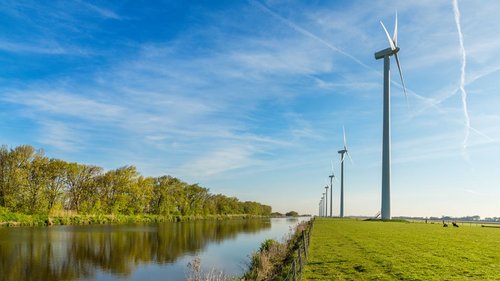Alongside digitalization, climate change is the megatrend of our time. Our economy is still largely dependent on fossil energies. How must the economy be shaped so that it is in harmony with the environment? What does an economically efficient and socially acceptable climate policy look like? How can energy needs be met more and more from renewable sources? Can the transformation to a circular economy succeed? These and other questions are addressed by the Environment Energy Infrastructure competence area at the Institute of German Business.
Environment
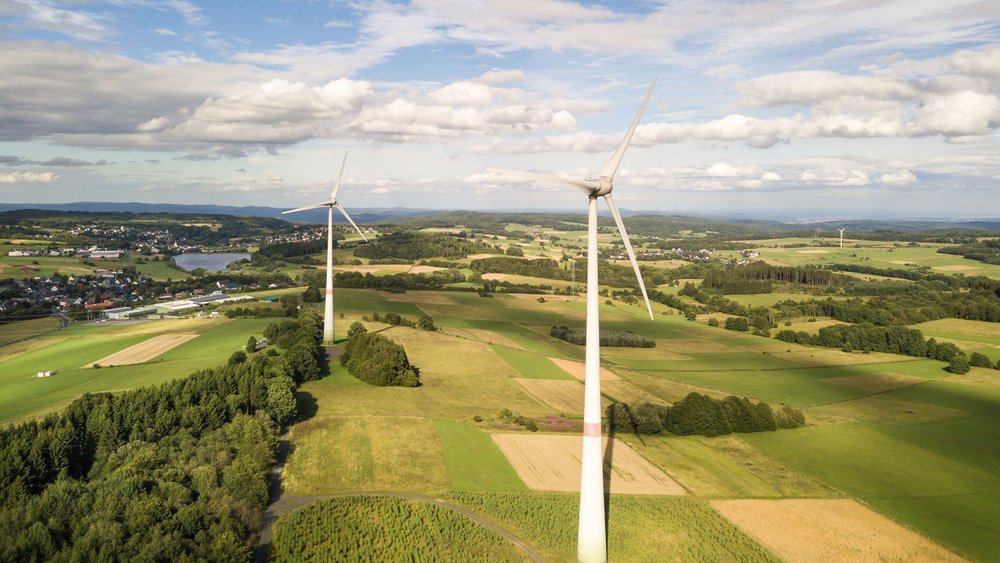
About the topic
In 2015, Germany and the EU set themselves ambitious goals by signing the UN Sustainable Development Goals or SDGs. Important levers for greater sustainability exist, for example, in transport, the building sector and industry. The EU also has big plans when it comes to climate protection: The Green Deal is intended to pave the way to a climate-neutral future. The money for this - one trillion euros - is to be raised via a fund and come from private investors.

Is the EU Fit for 55 and Beyond?
Ursula von der Leyen was elected President of the European Commission by the European Parliament in July 2019. She assumed office in November 2019 and unveiled the European Green Deal in December 2019 (European Commission, 2023a) as a focal point of European politics.
Christian Rusche / Thilo Schaefer in Intereconomics IW
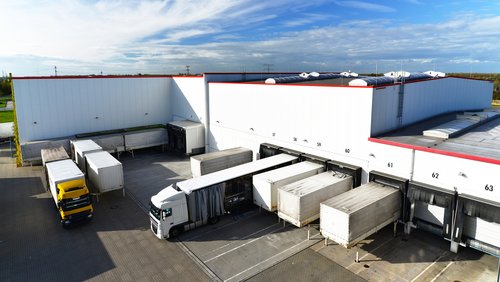
Due Diligence - Effect of Supply Chain regulation: Data-based results on the effects of the German Supply Chain Act
After the agreement of the European Parliament and the Council of the EU in December 2023, a few formal steps remain to introduce the Corporate Sustainability Due Diligence Directive (CSDDD).
Galina Kolev-Schaefer / Adriana Neligan IW
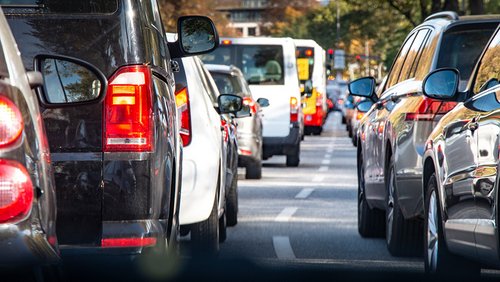
Compendium 5.4: CO2 Regulation of Road Transport in Europe
With the Compendium CO2 Regulation in Europe, the IW has been providing the interested public with a comprehensive collection of data on the development of CO2 emissions from passenger car traffic in the European Union, as well as on the applicable regulatory ...
Thomas Puls IW

Digital Product Passport – Enabler of the Circular Economy
In a circular economy, a new understanding of economic activity and an alternative approach to raw materials are required. Resources should be used for as long as possible in order to reduce both the material and energy consumption as well as the waste and ...
Adriana Neligan / Carmen Schleicher / Barbara Engels / Thorsten Kroke IW
Our Experts

Prof. Dr. Hubertus Bardt
Managing Director
Tel: +49 221 4981-750 Mail: bardt@iwkoeln.de Hubertus Bardt @H_Bardt
Andreas Fischer
Economist for Energy and Climate Policy
Tel: +49 221 4981-402 Mail: fischer@iwkoeln.de
Dr. Adriana Neligan
Senior Economist for Environment, Circular Economy and Sustainability
Tel: +49 30 27877-128 Mail: neligan@iwkoeln.de Adriana Neligan @a_neligan
Thomas Puls
Senior Economist for Transport and Infrastructure
Tel: +49 221 4981-766 Mail: puls@iwkoeln.de
Dr. Thilo Schaefer
Head of Digitalisation and Climate Action Research Unit
Tel: +49 221 4981-791 Mail: thilo.schaefer@iwkoeln.de Thilo SchaeferAlongside digitalization, climate change is the megatrend of our time. Our economy is still largely dependent on fossil energies. How must the economy be shaped so that it is in harmony with the environment? What does an economically efficient and socially acceptable climate policy look like? How can energy needs be met more and more from renewable sources? Can the transformation to a circular economy succeed? These and other questions are addressed by the Environment Energy Infrastructure competence area at the Institute of German Business.
All news
Is the EU Fit for 55 and Beyond?
Ursula von der Leyen was elected President of the European Commission by the European Parliament in July 2019. She assumed office in November 2019 and unveiled the European Green Deal in December 2019 (European Commission, 2023a) as a focal point of European politics.
Christian Rusche / Thilo Schaefer in Intereconomics IW
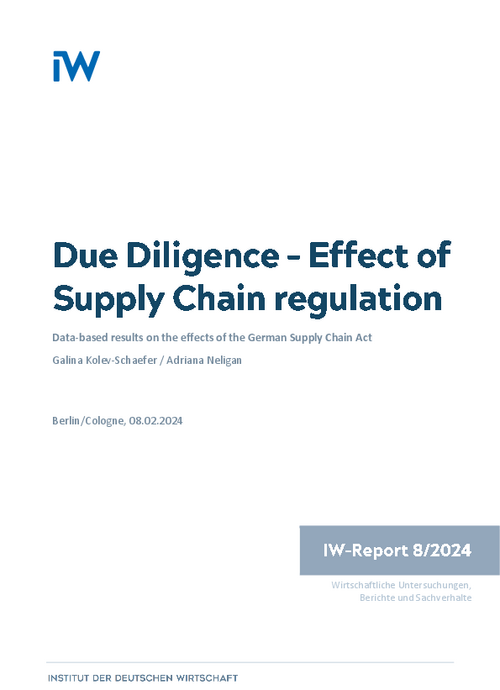
Due Diligence - Effect of Supply Chain regulation: Data-based results on the effects of the German Supply Chain Act
After the agreement of the European Parliament and the Council of the EU in December 2023, a few formal steps remain to introduce the Corporate Sustainability Due Diligence Directive (CSDDD).
Galina Kolev-Schaefer / Adriana Neligan IW
Compendium 5.4: CO2 Regulation of Road Transport in Europe
With the Compendium CO2 Regulation in Europe, the IW has been providing the interested public with a comprehensive collection of data on the development of CO2 emissions from passenger car traffic in the European Union, as well as on the applicable regulatory framework, since 2015.
Thomas Puls IW
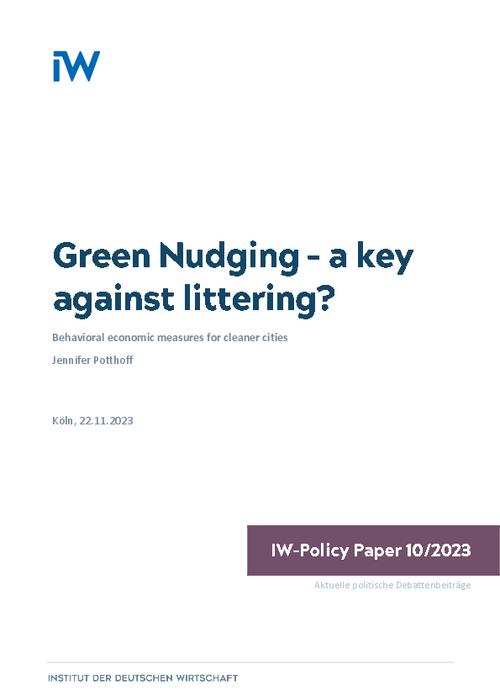
Green Nudging – a key against littering?
The demand for cleanliness in cities is increasing: "Littering" - the illegal littering of public spaces - does not only cause costs for the environment and society, but also has significant financial consequences through increased cleaning costs.
Jennifer Potthoff IW
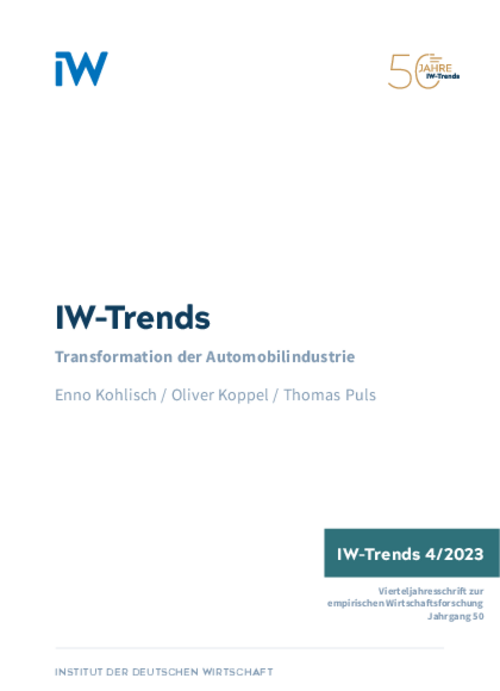
The Transformation of the Automotive Industry: An International Comparison of Germany's Innovation Performance
The automotive industry is undergoing a comprehensive technological transformation that is challenging established value chains. Making sure that domestic research helps to shape this ongoing transformation is therefore an important task for countries with a significant car industry.
Enno Kohlisch / Oliver Koppel / Thomas Puls IW
Your search returned an incorrect status. You may have selected too many filters. You can jump back to your previous selection to adjust your search.
With our new newsletters on the following topics you no longer have an IW publication.
We send out our topic-specific newsletters every month.
Register here
With our new newsletters on the following topics you no longer have an IW publication.
